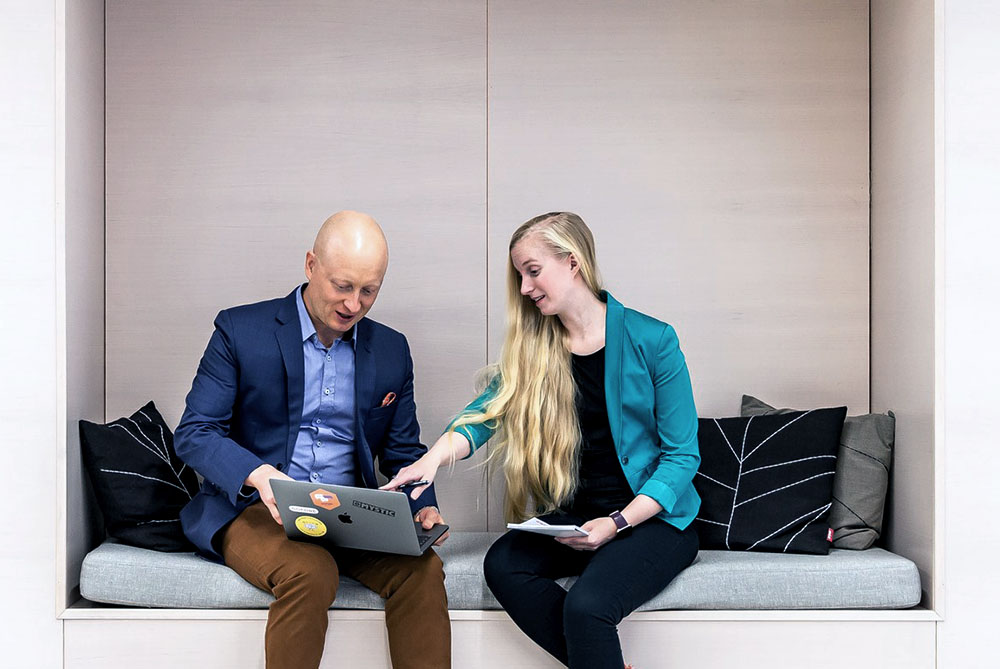To honour the June 1969 Stonewall Uprising in New York, a tipping point for the Gay Liberation Movement in the U.S., each year June is celebrated as the LGBT+ (lesbian, gay, bisexual, transgender etc.) Pride month. Rooted in protests and fight for equality, Pride month is not only about celebrating and recognising the LGBT+ community and its history, but also an opportunity to bring awareness to the issues the community is still facing, and to peacefully protest. (Though Pride events, such as Helsinki Pride, have been postponed due to the COVID-19 pandemic, I’m sure we’ll still see plenty of rainbow flags and LGBT+ -related discussions and articles on social media and in different publications.)
But what about the other eleven months? We are here all the rest of the year too and the issues that Pride month provides a larger and more visible platform for do not go anywhere after the surge of Pride posts and rainbows fades away. Showing support for the LGBT+ community does not require waving flags or adding rainbow Facebook profile frames. Surely it is a lot easier, for example, for a company to slap a rainbow on their logo than to actually improve the work environment for LGBT+ employees. But if you want to support and show up for your LGBT+ employees and co-workers for the rest of the year too, here are a few things you can do.
(It’s important to note that these are not all my original ideas but rather something I’ve learned from others in the LGBT+ community or from allies. I was heavily inspired for example by a video Franchesca Ramsey made on being an ally. This also is not an exhaustive or perfect list. I too am still learning how to better support people in my own community – especially those that are not just LGBT+ but belong other minorities by being, for example, non-white or disabled.)
However, before I get to the meat of this article, there are two things I want to say.
Firstly, I’ve occasionally come across the attitude that a person’s LGBT+ identity does not belong to a workplace because it is not relevant for their work. Openly being who we are is made into a political act or something that belongs in our personal lives, but not our professional lives. Of course it is a person’s own choice what information they disclose about themselves at work. But the same way as straight people have the right to talk about their spouse, kids, hobbies etc. to their co-workers, LGBT+ people should too. You have every right to think that me being trans and queer is unnatural, wrong, sin, or not real, but whether I deserve the same human rights and respect as everyone else, is not a matter of an opinion.
Secondly, you don’t need to know all the terminology or to understand someone’s experience to respect them and their identity. It’s okay if you can’t wrap your head around the disconnect I experience from my body as a transgender person or how someone is attracted to the same gender they are – or doesn’t feel sexual or romantic attraction at all (asexual and aromantic folks exist too). And there are so many different terms and identity descriptors that I cannot keep up with them either. But that does not make them less valid. Some people find comfort in labels by being able to give a name to what they are feeling. Labels allow us to talk about these different experiences and to form communities around them. Meanwhile some find it difficult or unnecessary to select specific descriptors and prefer more generic labels (such as queer*) or no labels at all.
Now, how can you be a better co-worker for LGBT+ people?

Understand your privilege
Having privilege does not mean that your life hasn’t been hard or that you have not struggled or had to work for where you are in life. Privilege just means that there are things that you will not experience or need to think about simply because of who you are. For example, I am an able-bodied person capable of walking up the stairs so I’ve never gone to a place only to find out that I can’t go in because there are steps and no ramp. Or I’ve not been cat-called because I look like a teenage boy. It is important for me to understand that there are challenges that I don’t face because who I am but that those challenges are still very real for others. I could also, without realising, misuse my privilege by, for example, speaking over someone that will be taken less seriously because of who they are.
Having privilege is not your fault or makes you a bad person. But it is important to understand your privilege so you can start to see how it impacts you and others.
Listen to LGBT+ people
Overall, the first step of showing support to someone, whether they belong to a minority or not, is listening to them, to their experiences, and to needs. Franchesca Ramsey gave a great example in her video about being a LGBT+ ally: “Imagine your friend is building a house and they ask you to help but you’ve never built a house before. So it would probably be a good idea for you to put on some protective gear and listen to the person in charge. — It’s the exact same idea when it comes to being an ally. An ally is a person that wants to fight for the equality of a marginalised group that they are not a part of. We need your help building this house but you probably should listen so you know what to do first.” In addition to listening to your co-workers, I highly recommend seeking out people on social media or otherwise online are reading and listening what they have to say.
Speak up – but not over
Now that you have listened to LGBT+ people and want to help, you can use your voice to amplify theirs. Spread the message, educate others, and use your privilege to get people to listen, we appreciate that. But still keep your ears open for what the community itself has to say. Try not to speak over or take credit from the people you are trying to support.
Respect people’s names, pronouns – and even ask if you’re unsure
This should be a no-brainer. If someone asks you to use a certain name or pronouns for them or not use gendered language for them (like call them miss or mister), just comply. Though pronouns person uses are often called “preferred pronouns”, using them is not optional. Those are their pronouns. This might sound like a lot but think of it this way: you are able to remember a person’s name, right? Pronouns aren’t that much extra information.
Also, they/them pronouns are your friend. If you don’t know someone’s pronouns and don’t want to assume, you can ask for their pronouns or just refer to them with ‘them’. (Like I just did.) ‘They’ can also be used to replace the clunky phrase of saying “he or she” when speaking in more general terms. It is shorter, easier, and more inclusive. (James Acaster has a great bit about pronoun they.)
Opt for more gender-neutral language
No worries, you have every right to use whatever gendered terms for yourself or your friend group – if those apply to them. Nobody is trying to take your gender or its expression away from you. But using more gender-neutral language for other people does not take anyone’s gender away from them – it just is more inclusive meaning it includes everyone. For example, the phrase “ladies and gentlemen” can be replaced with “guests”, “colleagues”, “dear friends”, “honourable guests”, “folks”, “everyone” – or “friends and enemies” if you’re feeling spicy . Learning new phrases and words doesn’t need to be serious and you don’t need to be perfect – treat it as a process of discovery or interesting exercise instead.
However, something that really is not cool is singling people out based on their gender – or assumed gender. I can’t tell you how many times someone has said “what do you think guys (jätkät/äijät)… and [insert my birth name]” or “alright gentlemen… and a lady”. Even before I understood I was trans, such phrases made me feel othered and opposite of included (which was the intention of the speaker). It sounds like a stupid gripe, but over time, things like this add up and make one feel like they don’t belong.
Do your own research and educate yourself
This point is not about needing to learn everything, but rather that you should educate yourself and not expect the minority to do all the emotional labour of teaching you. When there’s something you don’t know or understand, research it yourself first. Find out what people that the issue applies to have written about it and try to learn from existing material. If there’s something you need to process and work through, try to do that with other allies that are also learning.
If you want to ask, for example, a LGBT+ co-worker about an issue, ask first whether they have the time and energy to talk about it. Sometimes we are up to sharing and educating – like I am doing in this post and in some of my other writings – but other times we’re not. Especially if you are not willing to listen and rather want to debate, we’re probably not going to want to engage in that conversation. Not because we don’t have anything to say or an argument to make, but because we’ve had or seen that conversation play out tens or hundreds of times in your lives and we’re tired of it.
Don’t tokenise people
The Oxford Dictionary defines tokenism as “the practice of making only a perfunctory or symbolic effort to do a particular thing, especially by recruiting a small number of people from underrepresented groups in order to give the appearance of sexual or racial equality within a workforce”. For example, including a person of colour or a member of the LGBT+ community in a working group, but not actually making the changes they suggest, is a form of tokenism. Similarly someone saying that they’re not racist because they have a black friend, is them tokenising their friend.
You’ll make mistakes and it’s okay. Apologise, learn, and move on

We all make mistakes. Sometimes we say something we didn’t fully think through, or did not realise was offensive, or inaccurate. It happens. But when you get called out for it, don’t start a debate about it. Just listen, apologise, learn from that experience, and strive to do better in the future. And then move on.
* In the past ‘queer’ has been used as a derogatory term against LGBT+ (mainly gay, lesbian, and bisexual) people. However, over the 2000s, the LGBT+ community has slowly reclaimed the phrase and it has become and umbrella term to describe a broad spectrum of non-normative sexual and gender identities. Not all LGBT+ people like or identify with the term, while others like the broadness of the term. There is also other more complex discourse around the term and differences between LGBT+ and queer.
Ossian Rajala



